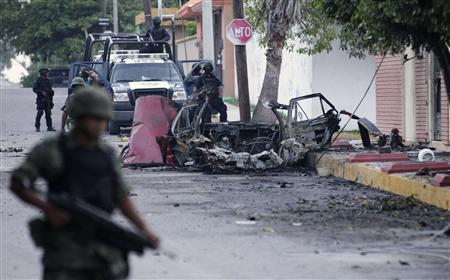Most drug war observers know that drug-related violence—especially in industrial and metropolitan areas like Ciudad Juárez—has a negative impact on the local community. But, the University of Texas-El Paso (UTEP) has recently published a report detailing the various short- and long-term effects of this violence on Mexican businesses, and how this has had some effect on Texas border communities.
According to the UTEP report “Drug Violence, the Peso, and Northern Border Retail Activity in Mexico” by UTEP professors Tom Fullerton and Adam Walke, this impact has been felt most strongly in Ciudad Juárez, which is a mere stone’s throw away from El Paso, although the study also examined retail sales, wages, unemployment, vehicle and pedestrian border crossings and homicides, from July 2007 to December 2010, in Tijuana, Mexicali, Nuevo Laredo, Reynosa, and Matamoros. A full one-quarter of the drug-related homicides that occurred during this time period happened in these six cities.
Trying to estimate the exact loss of revenue that stemmed from the violence has been difficult, but Fullerton said, “It is definitely in the millions of dollars.” The report indicated that while the large maquiladoras, or mass-production factories, were largely insulated from the violence because big companies could afford additional security, it was the smaller local businesses that really bore the brunt of the impact.
Strangely enough, the violence in Ciudad Juárez did not result in a mass exodus from the city across the border into El Paso; most of the residents and business owners who decided to flee went to neighboring Mexican states or areas instead. This also wasn’t a huge boon for El Paso businesses. “Some people who had the visas to cross the border did not have the money to spend, so it did not affect U.S. retail businesses in a big way,” Fullerton explained to the El Paso Times.
Fortunately, the homicide rate in Ciudad Juárez has been dropping precipitously in the last three years, which means more shuttered businesses are reopening, and cross-border trade and travel between the Mexican border city and El Paso have improved markedly. However, this improvement comes more as a result of Mexican drug cartel and gang dynamics in the city more than by improved policing.
Sylvia Longmire is a border security expert and Contributing Editor for Breitbart Texas. You can read more about cross-border issues in her latest book, Border Insecurity: Why Big Money, Fences, and Drones Aren’t Making Us Safer.

COMMENTS
Please let us know if you're having issues with commenting.